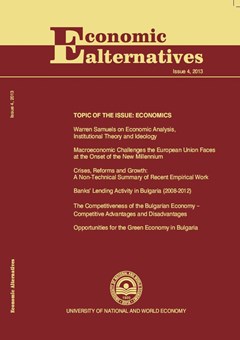Macroeconomic Challenges the European Union Faces at the Onset of the New Millennium
Author: Еmilia Georgieva
Abstract
The macroeconomic challenges occupy a prominent place among the configuration of external and internal challenges which the European Union faces, including in the beginning of the new millennium. They are of various nature and gravity, and accordingly shape the economic landscape in the EU member states and the Union as a whole. Of greatest importance among these, to name a few, are stimulating economic growth, promoting employment, fighting high and growing unemployment, and the early detection and correction of macroeconomic imbalances. In this relation, also of key importance is to clarify the new accents in the EU policies in response to these challenges within the context of its primary legislation, major initiatives and visionary messages of its leaders. The author’s main purpose is to formulate the most critical macroeconomic challenges, provide arguments for their origin, evolution and resolution, and support with current Eurostat data the different levels of analysis, including EU-27, EU-28 (ЕU-27 and Croatia); the euro area (17); the PIIGS group of countries (Portugal, Ireland, Italy, Greece and Spain) and the BELL countries (Bulgaria, Estonia, Latvia and Lithuania). Apart from Eurostat, other data sources include: EU treaties, regulations, policy documents, etc. from the examined period.

